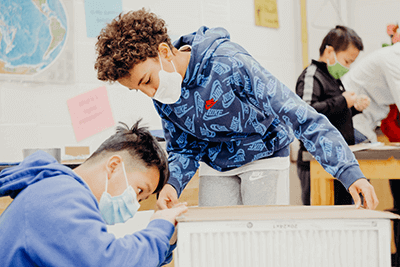February 24, 2022
 from Dr. Bill Hudson, Head of School
from Dr. Bill Hudson, Head of School
While walking the indoor track in the Lansing Sports Center last Friday, I took note of a large wooden structure assembled on Court Four. I had a hunch that it was a model constructed by our students on the FIRST Robotics team. If you are not familiar with FIRST Robotics, it is an international organization that combines “the excitement of sport with the rigors of science and technology.” I’ve been to several competitions, and I have to agree. According to FIRST Robotics, “teams of students are challenged to raise funds, design a team ‘brand,’ hone teamwork skills, and build and program industrial-size robots to play a difficult field game against like-minded competitors. It’s as close to real-world engineering as a student can get.”
FIRST Robotics is a terrific example of inquiry and problem-based activities that align with our MPA science philosophy of fostering creative, inquisitive, and critical thinkers. The science department is firmly rooted in the idea of the “citizen scientist,” a term that encompasses scientific research, concepts, and principles and public engagement in order to expand the reach, relevance, and impact of science to the whole of society in service of the common good. It is true that a number of MPA graduates go on to become doctors and scientists. It is also true that when they chose other fields of studies or careers, MPA graduates carry with them the knowledge and experience of how science impacts our world.
What is unique about the MPA science philosophy and curriculum is the emphasis on engaging students in the application of scientific method, principles, and research to real-world problems and nurturing important competencies and skills. Taking an inquiry-based approach, students working individually or collaboratively come to understand how content is useful and can be applied to everyday problems, both large and small. The following are only a few examples of our distinctive approach in action.
Upper School students are actively engaged in our native plant garden and pond area, truly an outside classroom and laboratory, for experimentation and research into water quality, turtles, birds, and native plants. This fall, Upper School biology classes participated in Bumble Bee Watch, where they identified the different species of bumblebees living in our native plant garden. Students searched for the elusive rusty patch bumble bee (Bombus affinis) but were unsuccessful. This information is reported to the Bumble Bee Watch website and each student’s submission is located on a map and precisely identified. The goal of the Bumble Bee Watch is the mapping of the different species across the US, Canada, and Mexico to see where species are rare and abundant.
Courtney Nagle, our incredibly inventive fifth and sixth grade science teacher, created an interdisciplinary project-based zombie unit to engage fifth graders in learning and applying principles of science. Students worked collaboratively to problem-solve their way through a series of challenges that required critical and design thinking. They even created a “Thriller” dance a la Michael Jackson!
Our eighth grade science classes recently participated in the Future City competition. The entire eighth grade team of teachers collaborated across math, social studies, English, technology, and science to support the students. Future City is a national program that starts with a question—how can we make the world a better place? To answer it, our students imagine, research, design, and build cities of the future that showcase their solution to a citywide sustainability issue. They learn how to apply skills in collaboration, public speaking, and creativity together with their knowledge of latest innovations in science, technology, and engineering.
The MPA science curriculum is aligned with Minnesota state standards and the Next Generation Science Standards (NGSS), utilizes data-driven decision making, and incorporates curricular and pedagogical research as it engages student learning. Our focus is centered on providing true inquiry activities and experiments while also giving students the background they will need to take science courses in college and be successful in the effort. Standardized exams (ACT-Aspire) at the Middle School level show a high level of competency when compared with the average state and national norms. At the Upper School level, students take a variety of national assessments (AP Biology, SAT II in Biology, and American Chemical Society exam in chemistry.) In addition, the results of the standardized tests that most students take (ACT, SAT) show that our students compare favorably with state and national norms in science for those exams.
Jacob Bronowski, British scientist and mathematician, wrote in The Ascent of Man, “That is the essence of science: ask an impertinent question, and you are on the way to the pertinent answer.” Learning to ask the right questions, acquiring and honing an ability to look at a problem from multiple angles and perspectives, is at the heart of our science program at MPA. By going deeper into the exploration of the concepts and principles of science through inquiry-based, experiential learning that applies to real-world problems, MPA students emerge better prepared to live, learn, and thrive in today’s complex, globalized society.